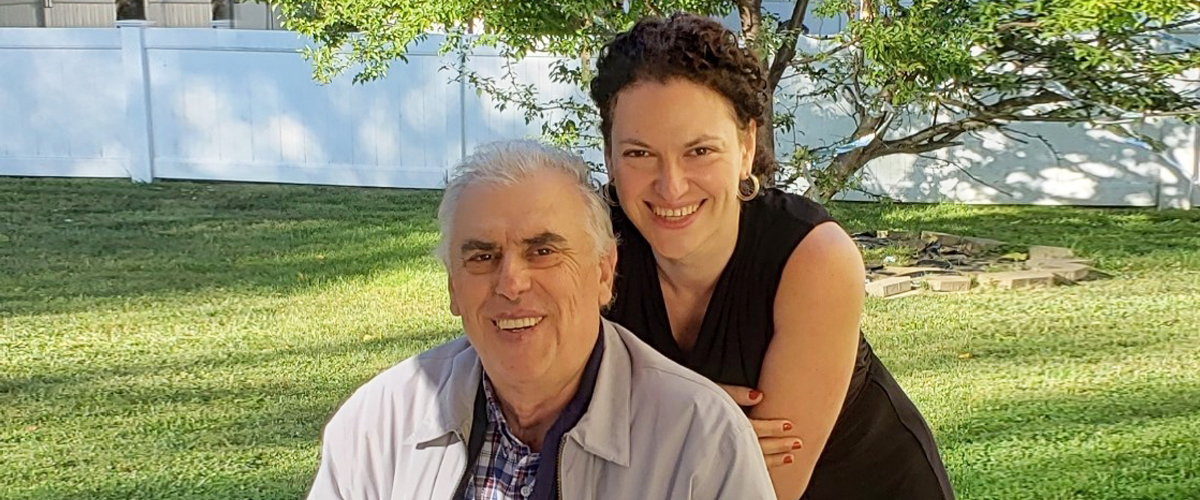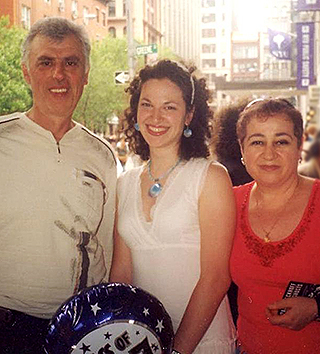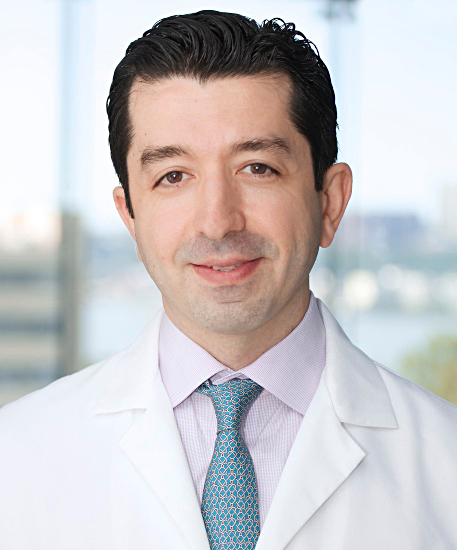Hope and Joy on Father’s Day
After he survived a near-fatal heart attack, Aleksandr Gartshteyn’s dedicated care team and the love of his family kept hope alive through a long recovery.


Dr. Yevgeniya “Jenny” Gartshteyn’s childhood is filled with happy memories of spending time with her dad, Aleksandr, reading books, composing poems, and making puppet shows. Later in life, “I remember hours with my father sitting and learning English with me,” says Jenny, who immigrated to the United States from the Ukraine with her parents when she was 8. “He’s a very hardworking and extremely kind person. He rarely does or asks for things for himself. His whole life has been about giving.”
But over the past year, Aleksandr Gartshteyn, 66, a retired MTA engineer, has been on the receiving end of the love and support he’s always shown his family and friends.
On Memorial Day last year, while playing with his grandsons at Jenny’s house, he began to feel ill. “He started to look pale, and sweat just started pouring down his face,” says Jenny, a rheumatologist at NewYork-Presbyterian/Columbia University Irving Medical Center. When he complained of discomfort in his upper abdomen and chest area, Jenny worried he could be having an issue with his heart. “We decided to take him to NewYork-Presbyterian/Columbia to get some tests and bloodwork, to make sure everything was OK, since it was very strange and sudden,” she remembers.

Jenny Gartshteyn, center, with her parents, Aleksandr and Faina, at her medical school graduation.
They arrived at the emergency room, and at first Aleksandr seemed to be stable. One of the nurses made a joke, and he laughed. “Then, all of a sudden, his eyes rolled back and he was no longer laughing or responding,” Jenny recalls. “Somebody checked his pulse, and they said, ‘He doesn’t have a pulse.’”
Lifesaving Efforts
Doctors, nurses, and support staff filled the room and started performing CPR. One of the staff members took off Aleksandr’s necklace, which held special meaning, and gave it to Jenny. “The necklace is in Hebrew and means ‘life,’” says Jenny. “I wore it around my neck the entire time he was in the hospital.”
Aleksandr was unresponsive for more than 30 minutes as the medical team performed lifesaving measures.
“He went into a very complicated and lethal heart rhythm, not compatible with life,” recalls Dr. Amirali Masoumi, one of the cardiogenic shock cardiologists at NewYork-Presbyterian/Columbia who treated Aleksandr. “Our medical team’s resuscitation efforts were crucial, and they maintained blood flow to the vital organs.”

Dr. Amirali Masoumi, one of the cardiogenic shock cardiologists who treated Aleksandr.
After his pulse was finally revived, he was intubated and transferred to the cardiac intensive care unit (CCU).
Aleksandr’s care team watched his condition closely throughout the night. With his blood pressure dropping and not responding to medications, his doctors decided his only chance for survival was to connect Aleksandr to a life support machine called ECMO (extracorporeal membrane oxygenation) to help his heart and lungs work. “After that, he showed gradual signs of improvement,” says Dr. Masoumi.
Within several hours, Dr. Masoumi and the team – including cardiothoracic surgeons Dr. Koji Takeda and Dr. Yuji Kaku, and heart failure critical care specialists Dr. LeRoy Rabbani, Dr. Nir Uriel, and Dr. Justin Fried – found the blockage that caused the heart attack and inserted a stent to open up his artery. It helped solve one of the immediate issues, but Aleksandr faced more complications.
“As his heart healed, his lungs became a problem,” says Jenny.
Over the next several weeks, the care team worked to improve his lung function, performing multiple bronchoscopies to treat pneumonia, and eventually a tracheostomy (inserting a breathing tube in the neck).
“She was pushing me – she tried to help me and I tried to be strong for her.”— Aleksandr Gartshteyn
“This was a real heroic team effort,” says Dr. Masoumi. “In addition to the cardiologists and cardiogenic shock team members, multidisciplinary experts in pulmonology, infectious disease, perfusion, critical care nursing, nutrition, physical therapy, occupational therapy, social services, and more were all heavily involved in his care.”
Says Jenny: “There were hiccups and complications along the course. Day by day there was very little progress, but week by week there was some improvement, so there was hope.” After a long and difficult month, Aleksandr finally opened his eyes, and Jenny was relieved that he recognized her.
As doctors gradually woke Aleksandr from deep sedation, they were encouraged: He could open his eyes, nod yes or no, and move his arms. They were soon able to remove him from the machines that had kept him alive.
Aleksandr does not remember much of his first month in the hospital, since he was unconscious and sedated. But he remembers waking up and seeing his daughter. “It was great to see her face,” he says. “She was pushing me – she tried to help me and I tried to be strong for her.”
“As he woke up, his brain was sharp,” says Dr. Masoumi. “His brain function came back to 100%.” During his recovery, Dr. Masoumi recalls walking into Aleksandr’s hospital room one weekend to find him doing Jenny’s taxes. “He was so motivated to recover.”
Dr. Masoumi says Aleksandr’s family was “essential” to his recovery, and he was impressed by their tight bond and resilience. “They believed in each other,” he says.
A Special Father’s Day
After more than two months in the hospital, Aleksandr was finally strong enough to go home. Jenny says it was a meaningful moment when she could return her father’s necklace to him.
“One of the cardiologists commented on how it is a symbol of life,” she says. “My father continues to wear it.”
His care team has been cheering him on the whole way. “Our team becomes champions for our patients, and it hurts us if things are not moving in the right direction. To see Aleksandr go home is one of our proudest moments,” says Dr. Masoumi. “You see how precious this life is to everyone, and you become a part of that journey with the family. It’s priceless to see pictures of him and his grandchildren as he recovers. We’re so happy that we can form a dedicated team to help these very ill patients and bring them back to life and their families.”
Aleksandr has made a strong recovery, but he still faces some challenges and is working to regain the use of his legs. He was diagnosed with critical illness myopathy and neuropathy, which patients can develop after an extended hospital stay. “He doesn’t have the sensation or strength to move his legs,” says Jenny. He is going to physical therapy five times a week and hoping to regain strength.
As Aleksandr continues to work hard to regain his physical strength, his perseverance is already paying off. “He wanted his independence and to drive, so he did all the research and took courses in hand-control auto driving. Now, though he still cannot walk, he can drive, and that means a lot to him,” says Jenny.
After Aleksandr was discharged from the hospital, he and his wife, Faina, moved in with his daughter. Aleksandr reads to Jenny’s children, as he did with Jenny when she was young, and is teaching them to play chess. This Father’s Day, the family is moving into a bigger house that will fit everyone – Jenny; her husband, Vadim; her parents; her two sons – and her third child, due to arrive on Aleksandr’s birthday, August 26.
“It will be a memorable Father’s Day, because we are moving and have a lot to celebrate,” says Aleksandr.
Dr. Masoumi says he was touched by the love the Gartshteyns had for one another. “I have a 4-year-old daughter, and I really hope my daughter will be like Jenny and I’m loved by her the way she loves her father. They are so devoted to him, and that means he’s been an amazing father.”

